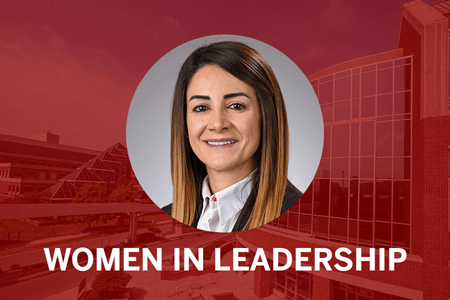“Girls can’t be doctors.”
As soon as 7-year-old Zeina Nabhan heard those words — from the mouth of a seasoned Lebanese doctor — the small-village girl with a fiery spirit became laser-locked on precisely that goal: “I told my mom, ‘I’m going to prove him wrong!’”
And she did.
Now on faculty at the Indiana University School of Medicine, Nabhan, MD, bucked the traditions of her farming village in Lebanon and studied her way — during a civil war — to scholarships for the American University of Beirut, known as the “Harvard of the Middle East.”
Today Nabhan is a professor of clinical pediatrics and associate dean of Graduate Medical Education, charged with overseeing diversity and wellness initiatives for IU’s 1,440 medical residents and fellows.
“The space I occupy now is a dream,” Nabhan said. “If you asked me 10 years ago if I could imagine myself — an Arab woman, a first-generation college student, and someone who talks with an accent — could you imagine yourself as associate dean of GME at the biggest medical school in the U.S.? No, I would not imagine it.”
It’s not for lack of ambition; Nabhan has ambition in spades. She simply didn’t know this career pathway existed.
An IU-trained pediatric endocrinologist who specializes in childhood obesity and Type 2 diabetes, Nabhan originally wanted to become a physician scientist. When she discovered non-citizens weren’t eligible for early-career research grants from the NIH, she pivoted to find her passion elsewhere in medicine. Nabhan did become a naturalized U.S. citizen 10 years after joining the IU School of Medicine faculty, but, she said, “I am not known for patience.”
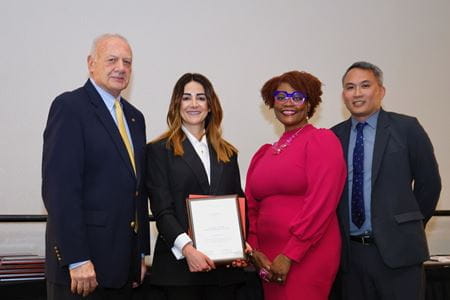 Through self-evaluation and conversations with career mentors, Nabhan realized, “Investing in the future of doctors brings me joy.”
Through self-evaluation and conversations with career mentors, Nabhan realized, “Investing in the future of doctors brings me joy.”
One of her most joy-filled professional moments came in February 2024, when she walked on stage at the annual conference of the Accreditation Council for Graduate Medical Education to accept the council’s 2024 Barbara Ross-Lee, DO Diversity, Equity and Inclusion Award on behalf of the IU School of Medicine. The award recognized the expansive diversity program Nabhan and her GME Diversity Committee created from scratch during the pandemic in response to national calls for racial justice and systemic reforms.
“Dr. Nabhan’s positive energy and passion to ensure that residents and faculty are always treated fairly and equally are what make her one of the best deans we have,” said Michael Adjei, MD, an assistant professor of clinical anesthesiology and a Ghanaian immigrant who worked closely with Nabhan as a resident physician to advance diversity initiatives at IU School of Medicine.
Jasmine Lee, MD, an upper-level resident in general surgery, worked alongside Nabhan within the Multicultural Physicians’ Alliance to develop recruitment initiatives targeting diverse trainees.
“Through the confidence and support I received under Dr. Nabhan’s guidance, I grew into a leadership role within my own department,” said Lee, who is now president of her residency program’s DEI Committee. “Dr. Nabhan recognized a strength in leadership within me even before I could see it myself.”
‘This is where I came from.’
Medical trainees from diverse backgrounds hold a special place in Nabhan’s heart. She similarly finds joy in her clinical practice when she works with patients and families from disadvantaged communities.
“Seeing that lack of privilege to be able to advocate for yourself resonates with me,” Nabhan said. “These are my people. This is where I came from.”
In Nabhan’s rural village, the social norm was for girls to be married off young. No one invested in a daughter’s education.
“Women were typically more demure, but I was feisty and wild — and my mom loved that,” Nabhan said. “From a young age, she always told me there’s more to a woman than just getting married, and I believed there was a better future for me.”
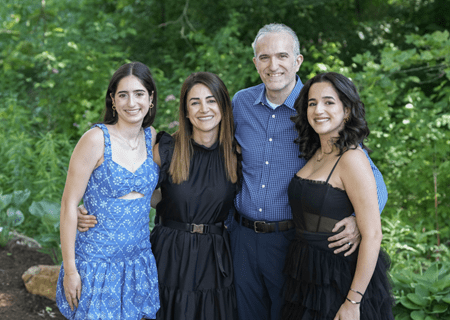 Nabhan’s parents sent her to a school in the nearest city. As the top graduate from her county, Nabhan received scholarships, but her parents sold land to pay for the remaining 25% of her educational costs.
Nabhan’s parents sent her to a school in the nearest city. As the top graduate from her county, Nabhan received scholarships, but her parents sold land to pay for the remaining 25% of her educational costs.
As a premed student at the American University of Beirut, Nabhan said she “was the total nerd who drove the curve and made it harder for everybody else,” including her future husband, Edmond Bendaly, MD, now a hematologist and oncologist affiliated with Marion Health.
While they began their relationship as rivals, Nabhan and Bendaly started dating during their second year of medical school. They now have twin daughters who are seniors in high school.
“For me, I was breaking glass ceilings — I was the first in my family and in my village to make it this far — and Edmond understood that,” Nabhan said. “He was my partner in life and my partner in this journey and was as proud of me as I was of myself. He continues to support me and gives me the grace to pursue this passion of mine.”
Nabhan knows her personality can be intense.
“As a leader, it is important to demonstrate a high level of emotional intelligence because the decisions you make impact a lot of people,” she’s learned.
When Nabhan first joined the GME team, the group’s former leader, Michelle Howenstine, MD, advised her to do nothing but listen for the first 90 days.
“That was great advice for me,” Nabhan said. “I enjoyed meeting people and learning their different personalities, working style, opinions and perspectives. You have to have a deep understanding of the work culture before you go changing things.”
‘These were the people I was waiting for.’
Bendaly’s enthusiasm for IU School of Medicine is what brought him and Nabhan to Indianapolis for specialty training following Nabhan’s intern year at Wayne State University in Detroit, where Bendaly was doing cancer research.
“He visited IU and absolutely fell in love,” Nabhan said. “He met a group of Lebanese residents and one chief resident (in internal medicine) who were thriving at IU School of Medicine, which increased his interest in IU.”
As luck would have it, a spot opened for Nabhan in the pediatric residency program, and she, too, fell in love with the people and opportunities at IU. When she later joined the faculty in the pediatric endocrine division, Nabhan said, “There was no shortage of amazing, successful women ahead of me in leadership.”
“They embraced me and supported me,” she said. “If I had a shred of self-doubt, they showed me the way. These were the people I was waiting for.”
So, when Nabhan came to her husband one day and declared, “I’m losing my joy,” he was surprised. Nabhan had watched others advance in their careers while she felt stagnant.
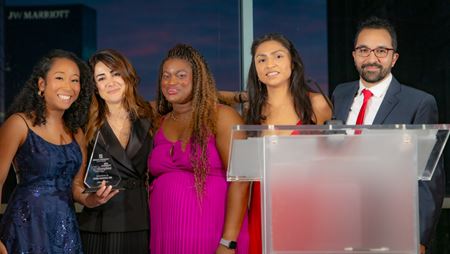 “My husband challenged me,” she recalled. “He said, ‘I find it hard to believe that you cannot find joy in an institution as big as IU.’”
“My husband challenged me,” she recalled. “He said, ‘I find it hard to believe that you cannot find joy in an institution as big as IU.’”
Nabhan sought mentors and examined the source of her discontent.
“I realized, all this time, I was taking from the institution and not giving back, not volunteering on committees and not putting myself out there,” she said.
After determining she wanted to be in medical education, Nabhan turned to her mentor, Mary Ciccarelli, MD, a New Yorker of Italian descent whom Nabhan trusted to give it to her straight.
“I told Mary, ‘I think I may find my joy in medical education,’” Nabhan recalled, “and she said, ‘What do you have to prove it?’”
As a result of that conversation, Nabhan joined the Academic Pediatric Association’s Educational Scholars program, a three-year commitment, and collaborated with colleagues across the nation to hone her skills as a medical educator.
At IU, Nabhan became the associate program director of the pediatrics residency program. In that role, she developed a collaborative pathway for international trainees to come from her home country of Lebanon.
‘Eventually, hard work will be recognized.’
One memorable day on her career journey, Nabhan got a call from Mara Nitu, MD, DC, MBA, another trusted mentor, urging her to apply to a leadership position within the pediatrics department. Nitu knew Nabhan wasn’t ready for that role but wanted to help set Nabhan on the path to leadership that would eventually land her a position in graduate medical education.
Nabhan now sees “failure” as a doorway to opportunity.
“You have to trust the process and not let pride get in the way,” she said. “Eventually, hard work will be recognized, and you will earn your spot at the table where you need to be sitting.”
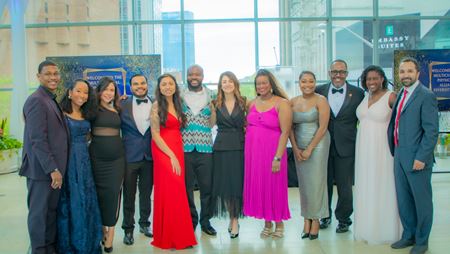 Nitu has long been impressed by Nabhan’s “relentless drive to excel” and vibrant personality.
Nitu has long been impressed by Nabhan’s “relentless drive to excel” and vibrant personality.
“She has a remarkable ability to find solutions in difficult situations, and her collaborative spirit ensures that everyone is brought along on the journey,” Nitu said. “Her leadership is characterized by empathy, resilience and a commitment to excellence.”
It’s safe to say Nabhan has rediscovered her joy.
Her passion is coupled with a heavy dose of persistence to ensure goals are met. That’s hardly surprising, considering this is the girl who once defiantly declared in response to a condescending doctor that she would one day be his equal.
“The reason I don’t quit is I reflect on my life and remember that little girl who dreamed one day to become a doctor and make her parents proud,” she said.
Nabhan recently spoke as part of the “Stepping Stones of Women in Leadership” series hosted by Faculty Affairs and Professional Development and the Women’s Advisory Council at IU School of Medicine. When asked about the next steps in her career, Nabhan paused and acknowledged, “There is one more thing in me yet to do — I am not sure what that next thing will be.”
Then, smiling, she said, “Where I am now is still bringing me joy.”
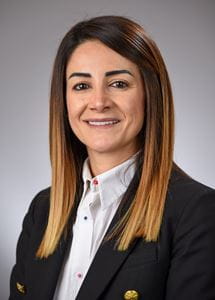 Women in Leadership at IU School of Medicine
Women in Leadership at IU School of Medicine
Women are leading the way in helping Indiana University School of Medicine fulfill its mission to advance health in the state of Indiana and beyond by promoting innovation and excellence in education, research and patient care. The Women in Leadership series celebrates the contributions of women who have emerged as strong leaders within the medical school and in their respective fields of expertise.
